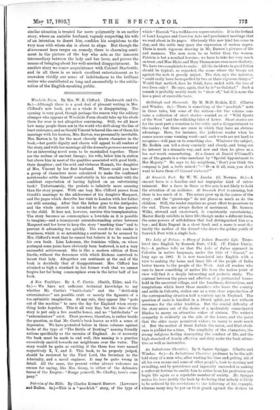The Lake of Palms: a Story of Indian Domestic Life.
Trans- hated into English by Romesh Dutt, C.I.E. (T. Fisher Unwin. 6s.)—A preface tells us that The Lake of Palms appeared in Calcutta in native language, under the title of " Sausar," as long ago as 1885. It is now translated into English with a, view to making the home and inner life of the people of India better known to the people of the West. And all readers who care to know something of native life from the native point of view will find it a deeply interesting and pathetic study. The contrast between the peace and affection of a patriarchal house- hold in the ancestral village, and the loneliness, distractions, and temptations which beset those members who leave the country and settle in Calcutta, strikes one as a very close reproduction of the corresponding situation half a century ago in England. The question of caste is handled in a liberal spirit, yet not without reverence for the older tradition. But the crucial difficulty of the story arises out of the desire of a moderately emancipated Hindoo to marry an attractive widow of sixteen. Tho writer's sympathy is evidently on the side of the lovers, and the point that the older usage permitted widows to marry is made much of. But the mother of &rat forbids the union, and filial obedi- ence is yielded for a time. The simplicity of the characters, the strong religious feeling dominating the conduct of life, and the high standard of family affection and duty make the book attrac- tive as well as instructive.






































 Previous page
Previous page